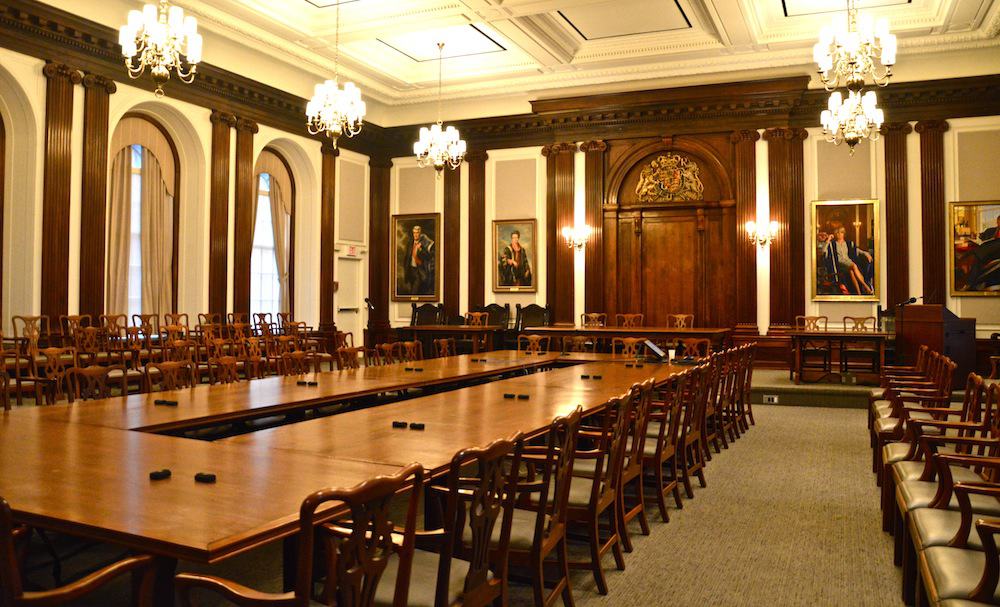With two weeks remaining until voting closes in the Governing Council elections, the race for the two Arts & Science positions is heating up. In total, 14 candidates have entered the election. In addition to the Arts & Science positions — which represent U of T’s 23,700 full-time, undergraduate Arts & Science students — there are also seats for representatives from the School of Graduate Studies, professional faculties, and part-time students.
The candidates hail from six of U of T’s undergraduate colleges, all three campuses, and the Transitional Year Program.
The Governing Council meets approximately six times a year and is the University of Toronto’s highest decision-making body, overseeing the academic, financial, and student affairs. On February 3, Shirley Hoy — Chief Executive Officer of the Toronto Lands Corporation, a subsidiary of the Toronto District School Board that manages the board’s real estate — was acclaimed as vice-chair of the Governing Council, effective July 1.
The council is comprised of 50 elected and appointed members, including the president and chancellor, 16 members appointed by the Ontario government, two members appointed by the president, 12 elected faculty members, eight elected alumni members, two elected administrative staff members, and eight elected student members. Of the eight students, four are full-time undergraduates — two of which are from the Faculty of Arts & Science. The other four are graduate and part-time students.
So far, the campaign has been a low-key one, with some candidates lacking advertising, such as a Facebook page. In candidate statements, posted on the Governing Council website, most speak of fostering student engagement across the three campuses, and creating more opportunities for students after graduation.
“Students only have eight out of 50 votes, but we can shift things towards our interests if the governors can engage students with the process,” said Ben Coleman, a full-time undergraduate candidate from New College who served as an Arts & Science at-large director on the University of Toronto Students’ Union (UTSU). Coleman said he wants to educate students about the role Governing Council plays in university life.
“Being a part of councils that bring change to education is something that I’m passionate about,” said Cole Dempsey, a full-time undergraduate candidate from University College. “I want to find what people think issues are and bring them to the table,” he said.
Dempsey mentioned his past experience in student government as his motivation for running — having spent time, while in high school, on councils with the Calgary and Alberta boards of education.
Another hot-button issue is a potential increase in tuition fees. When asked whether they would vote, if elected, to raise the tuition that U of T students pay, the response from candidates was almost uniformly negative. “I don’t see the need for tuition increases anytime soon,” said Ayla Shiblaq, a full-time undergraduate candidate from Victoria College, “I think we already pay enough to be a part of this institution.”
Kriti Bhatt, a full-time undergraduate candidate from Trinity College, echoed Shiblaq’s thoughts. Bhatt stressed that it should be others at the university — not full-time undergraduates — who see their tuition go up. “I’m a believer in the notion that, should funding increases be required, they can be found elsewhere — at the graduate and post-graduate levels, for instance,” said Bhatt.
Marc Laurin, a full-time undergraduate candidate from UTSC, went even further, noting that “reducing the costs associated with being a student” was his top priority.
Louis Train, a full-time undergraduate candidate from St. Michael’s College, is alone in saying he’ll consider a tuition increase — albeit with caveats. While Train made it clear that he is against an increase in fees for “non-academic purposes, such as recreational services and facilities,” he did say that he would “vote for a tuition increase if, and only if, it would benefit the undergraduate student body.”
While students occupy only eight of the council’s 50 positions, student governors often have an important influence. In the past, student governors highlighted important issues and pushed them onto the university’s agenda.
Over the past year, Aidan Fishman, a two-term full-time undergraduate student governor, drew attention to the need for greater discussion on the issue of fee diversion.
Some candidates have cited other concerns. One common concern was the lack of student life at the university, and the lack of community present on campus. Daniel Szulc, a full-time undergraduate candidate from Trinity College, cited student life as his top priority: “Undergraduate student life has always been, and continues to be, a current problem at U of T in comparison to other Ontario universities.”
Bhatt sees the university’s long-term vision as its biggest challenge, saying her top priority would be finding a way to “[agree] upon and [create] a cohesive and universally shared vision for the university’s future.”
Voting begins online on February 10 and ends on February 21. Results are expected on February 25.


